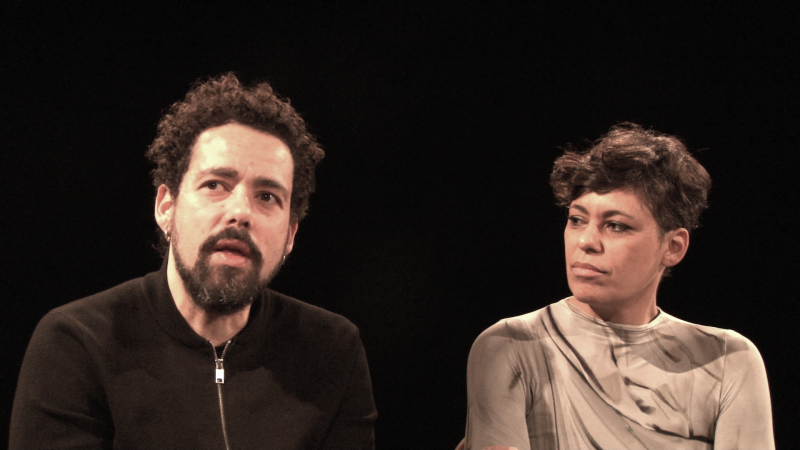
“We always blame the mother. It is a trace of patriarchy”
| 21 December 2023‘Elektra Unbound’ uses the format of an audition. Three young actors hunt for the role of Elektra. But in doing so, they very explicitly reveal their own disastrous lives. What is the meaning behind this?
Lua: “The ambition was to make a pastiche, which is a format within comedy that honors the original and mocks it at the same time. Within this mocking comes a form of social criticism. We are not casting the best Elektra, we are casting the most tragic person.”
“Nowadays, all of us portray ourselves as a product or a project, especially online. Within this, there is an exploitation of personal suffering, a fetishising of mental illness for likes. When you get to stand out from the mass on TikTok or Instagram, it’s because you are considered ‘authentic’. This so-called authenticity is strongly linked with standing outside of the norm in terms of neurodiversity, gender, or race. Through your struggle you become more authentic and profit from that. That’s very tragic.”
Pablo: “This exploitation is also visible in arts. Artists nowadays attract attention by showing how ‘unique’ they are as a person, even before they publish or release their work. It is fascinating yet very tragic, as Lua said. We show everything we are online, all our failures and tragedies, but merely one day after a new viral story comes and shades our suffering. There is no actual healing. This is happening to so many young people right now.”
Lua, you play the role of a director who wants to extract all these personal tragedies from the actors auditioning, because you know it sells. How close is your character to the Lua sitting in front of us?
Lua: “It is exactly like me. I am impressed people still want to work with me… (laughs) No, seriously, I try to be very friendly with my actors and my team. But every time I create a character for myself, I aim to say goodbye to a bad aspect of my personality. In this case, I wanted to deal with my anger. Not an abusive anger, but an intrinsic, natural anger I have towards forms of structural violence I experience because I am a woman, a person of color, a mother… ”
“Whatever the anger stems from, inspired by the character of Elektra I asked myself: what if I can be this one thing for the whole hour and a half of the play? How can I turn this anger into an aesthetic experience and perhaps heal myself a bit at the same time? Comedy is always an exaggeration of conflict.”
One of the important elements of Greek tragedies that you retained in ‘Elektra Unbound’, is the chorus. What role does it play?
Pablo: “To start with, it fulfils the two classical functions of telling - or singing - the story and commenting on it. In our piece, the chorus mainly comments on the characters, in a very judgmental way. We gave the chorus the role of a judgmental public eye, which refers to the comment sections on social media, or the critics that review artistic projects.”
Lua: “It was very established back in the day that the chorus was a political voice. It had to constitute the idea of democracy. In our performance, the chorus is representing the idea of freedom and impact we think we have with our online voice. We are all allowed to say almost anything we want online when we want to. But just like Elektra, who screams and screams and yet is so easily forgotten, we as citizens in democracy have no real impact on society or policies with our online voice. Even worse, we are constantly engaging in a very manipulating system that leads us to read only certain things, forms groups of like-minded people and increases polarisation. That’s what the chorus does in our show: highlight the deceiving workings of the algorithm.”
The cast of ‘Elektra Unbound’ consist, among others, of three actors who are or were theatre students when the rehearsals started. How is it to work with them?
Lua: “I don’t consider them students, they are trained actors and fabulous to work with. The creation of Elektra Unbound has been an amazing process. Together with the cast, Pablo and our dramaturg Joline Vermeulen, we got in touch with Greek tragedies, read many versions of the play, did extensive research… Then we built scenes together: iconic scenes from The Oresteia but also interviews, a format I wanted to work with for a long time. We sharpened jokes together, and deepened the characters. It was quite a technical process but so much fun.”
Was this a process similar to the way you created your previous performances? Or was it really different because ‘Elektra Unbound’ isn’t a monologue like ‘Ferox Tempus’ or ‘Short of Lying’?
Lua: “There’s a big part of my methodology that always comes back: the focus on the way language is almost always deceptive and the mechanisms behind this. This time I asked myself: how can all of the characters on stage be unreliable and have instability in their speeches and dialogues?”
“Writing dialogues for the first time was a challenge but I loved it. It gave me the opportunity to create so many nice interactions between people… The biggest struggle turned out to be cutting parts of what I wrote (laughs).”
--- interview by Jonas Mayeur and Joline Vermeulen

